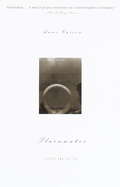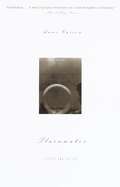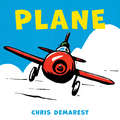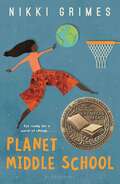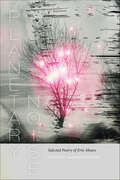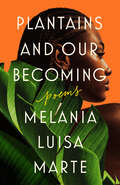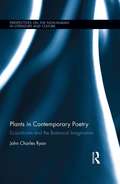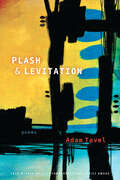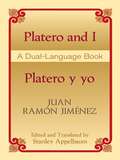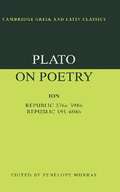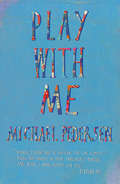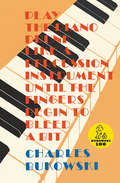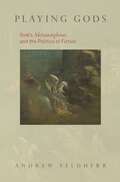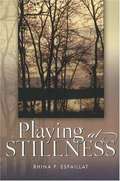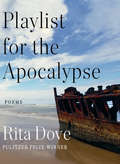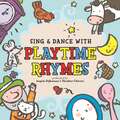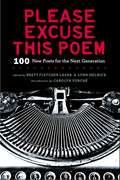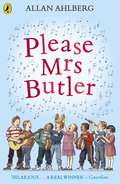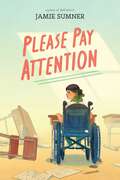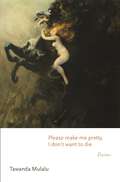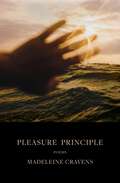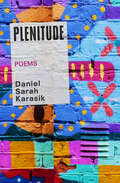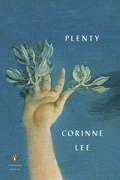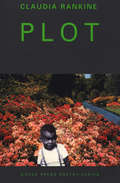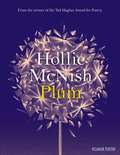- Table View
- List View
Plainwater
by Anne CarsonThe poetry and prose collected in Plainwater are a testament to the extraordinary imagination of Anne Carson, a writer described by Michael Ondaatje as "the most exciting poet writing in English today." Succinct and astonishingly beautiful, these pieces stretch the boundaries of language and literary form, while juxtaposing classical and modern traditions. Carson envisions a present-day interview with a seventh-century BC poet, and offers miniature lectures on topics as varied as orchids and Ovid. She imagines the muse of a fifteenth-century painter attending a phenomenology conference in Italy. She constructs verbal photographs of a series of mysterious towns, and takes us on a pilgrimage in pursuit of the elusive and intimate anthropology of water. Blending the rhythm and vivid metaphor of poetry with the discursive nature of the essay, the writings in Plainwater dazzle us with their invention and enlighten us with their erudition.
Plainwater: Essays and Poetry
by Anne CarsonA contemporary collection of poems and prose is filled with themes of loss and freedom and the narrator speaks from a place of quiet intensity that burns more vehemently with each observation. Constantly is the backdrop, the theme, and the language of water.
Plane
by Chris DemarestChris Demarest's Plane gets a refreshing update for the littlest listeners, but keeps its melodic charm. Plane lifts, soars high. Far below towns lie.The sky's the limit in this rhyming book from Chris Demarest. Perfect for little ones ready to soar. Check out Demarest's other transportation books, Bus, Ship, and Train, for more on-the-go charm!
Planet Middle School
by Nikki GrimesFor twelve years, Joylin Johnson's life has been just fine. A game of basketball with the boys-especially her friend Jake-was all it took to put a smile on her face. Baggy jeans, T-shirt, and hair in a ponytail were easy choices. Then, everything suddenly seemed to change all at once. <p><p>Her best girl friend is now flirting with her best guy friend. Her clothes seem all wrong. Jake is acting weird, and basketball isn't the same. And worst of all, there is this guy, Santiago, who appears from . . . where? What lengths will Joy go to--and who will she become--to attract his attention? <p><p> In short poems that perfectly capture the crazy feelings of adolescence and first crushes, award-winning author Nikki Grimes has crafted a delightful, often hilarious, heart-tugging story.
Planetary Noise: Selected Poetry of Erin Moure (Wesleyan Poetry Series)
by Erin MourePlanetary Noise: Selected Poetry of Erín Moure gathers four decades of poetry from a celebrated Canadian poet and translator who has persistently reconfigured the linguistic and material relations of English. Moure's poems and networked sequences are hybrid and often polylingual; they work with contradiction, paradox, and verbal detritus— linguistic hics and blips often too quickly dismissed as noise—to create new conditions for thought and pleasure. From postdramatic theatre to queer and feminist theory, from the politics of citizenship and genocide to the minutiae of digital poetics, from the clamor of love to the shadows of grief and memory, Moure has joyously toppled hierarchies of meaning and parasited dominant discourses to create poetry that crosses borders, embracing hope, not war. This volume, edited by poet and literary scholar Shannon Maguire, also features an extensive introduction to Moure's poetry, a section of poetry by others translated by Moure, and an afterword on translation by the poet. An online reader's companion is available at wesleyan.edu/wespress/readerscompanions.Hardcover is un-jacketed.
Plantains and Our Becoming: Poems
by Melania Luisa MarteA rousing, beautifully observed, and tender-hearted debut poetry collection about identity, culture, home, and belonging—for fans of Jasmine Mans and Fatimah Asghar &“We, children of plátanos, always gotta learn to play in everyone else&’s backyard and somehow feel at home.&” Poet and musician Melania Luisa Marte opens PLAINTAINS AND OUR BECOMING by pointing out that Afro-Latina is not a word recognized by the dictionary. But the dictionary is far from a record of the truth. What does it mean, then, to tend to your own words and your own record—to build upon the legacies of your ancestors? In this imaginative, blistering poetry collection, Marte looks at the identities and histories of the Dominican Republic and Haiti to celebrate and center the Black diasporic experience. Through the exploration of themes like self-love, nationalism, displacement, generational trauma, and ancestral knowledge, this collection uproots stereotypes while creating a new joyous vision for Black identity and personhood. Moving from New York to Texas to the Dominican Republic and to Haiti, this collection looks at the legacies of colonialism and racism but never shies away from highlighting the beauty—and joy—that comes from celebrating who you are and where you come from. PLANTAINS AND OUR BECOMING is &“a full-throated war cry; both a request for anointment and the responding bendición&” (Elizabeth Acevedo).
Plants in Contemporary Poetry: Ecocriticism and the Botanical Imagination (Perspectives on the Non-Human in Literature and Culture)
by John RyanPositioned within current ecocritical scholarship, this volume is the first book-length study of the representations of plants in contemporary American, English, and Australian poetry. Through readings of botanically-minded writers including Les Murray, Louise Glück, and Alice Oswald, it addresses the relationship between language and the subjectivity, agency, sentience, consciousness, and intelligence of vegetal life. Scientific, philosophical, and literary frameworks enable the author to develop an interdisciplinary approach to examining the role of plants in poetry. Drawing from recent plant science and contributing to the exciting new field of critical plant studies, the author develops a methodology he calls "botanical criticism" that aims to redress the lack of emphasis on plant life in studies of poetry. As a subset of ecocriticism, botanical criticism investigates how poets engage with plants literally and figuratively, materially and symbolically, in their works. Key themes covered in this volume include plants as invasives and weeds in human settings; as sources of physical and spiritual nourishment; as signifiers of region, home, and identity; as objects of aesthetics and objectivism; and, crucially, as beings with their own perspectives, voices, and modes of dialogue. Ryan demonstrates that poetic imagination is as essential as scientific rationality to elucidating and appreciating the mysteries of plant-being. This book will appeal to a multidisciplinary readership in the fields of ecocriticism, ecopoetry, environmental humanities, and ecocultural studies, and will be of interest to researchers in the emerging area of critical plant studies.
Plash & Levitation (Permafrost Prize Series)
by Adam TavelPlash & Levitation delves into the chaotic sublime of fatherhood, the candid revelations of youth, and the lingering consequences of history. Adam Tavel’s revealing and imaginative poems are joined by fictional monologues from historical figures and cultural icons, juxtaposing personal history with our shared one. Civil War general William Tecumseh Sherman and rock legend Keith Moon are joined by musings from the Redskins logo and the Wolfman. Together they create a lively chorus that clashes and soars. The result is forty-two fascinating pieces that are witty, consistently musical, and undeniably powerful—the perfect inaugural selection for the Permafrost Book Prize.
Platero and I/Platero y yo: A Dual-Language Book
by Stanley Appelbaum Juan Ramon JimenezThe most popular work by the great Spanish writer Juan Ramón Jiménez (1881-1958), this is a series of autobiographical prose poems about the wanderings in Andalusia of a poet and his donkey. This new, accurate English translation is drawn from the 1917 edition. This is the only dual-language edition available. Introduction, Explanatory Notes.
Plato on Poetry: Ion; Republic 376e-398b9; Republic 595-608b10 (Cambridge Greek and Latin Classics)
by Penelope MurrayPrior to publication of this 1996 book, much had been written on Plato as a critic of literature, but no commentaries had appeared in English on the Ion, or the opening books of the Republic in which Plato launches his famous attack on poetry, since the early years of this century. This volume brings together these texts and the relevant section of Republic 10. It aims to provide the reader with a commentary which takes account of modern scholarship on the subject, and which explores the ambivalence of Plato's pronouncements on poetry through an analysis of his own skill as a writer. A general introduction sets Plato's views in the wider context of attitudes to poetry in Greek society before his time, and indicates the main ways in which his writings on poetry have influenced the history of aesthetic thought in European culture.
Play With Me
by Michael PedersenThe acclaimed Scottish poet&’s debut collection shares poems &“so physical you can almost touch the images in them. Fabulously sensual and alive.&” (Stephen Fry). Writer and performer Michael Pederson has built a reputation as a critically acclaimed poet-provocateur. His live readings are as memorable as they are witty, laced with an electric energy, as he recites his accessible yet deeply layered poetry from memory. From NHS overdose clinics to overrun gardens, talking Cambodian treehouses to the teenage perversion of a young Scot on a French Exchange, the poems in Pedersen&’s first collection offer a rich and fantastical feast of flavors, landscapes and language. On the menu is everything from iced oysters and chateaubriand to pickled onions and Buckfast-soaked bread sticks.
Play the Piano
by Charles BukowskiPlay the Piano introduces Charles Bukowski's poetry from the 1970s. He leads a life full of gambling and booze but also finds love. These poems are full of lechery and romance as he struggles to mature.
Playing Gods: Ovid's Metamorphoses and the Politics of Fiction
by Andrew FeldherrThis book offers a novel interpretation of politics and identity in Ovid's epic poem of transformations, the Metamorphoses. Reexamining the emphatically fictional character of the poem, Playing Gods argues that Ovid uses the problem of fiction in the text to redefine the power of poetry in Augustan Rome. The book also provides the fullest account yet of how the poem relates to the range of cultural phenomena that defined and projected Augustan authority, including spectacle, theater, and the visual arts. Andrew Feldherr argues that a key to the political as well as literary power of the Metamorphoses is the way it manipulates its readers' awareness that its stories cannot possibly be true. By continually juxtaposing the imaginary and the real, Ovid shows how a poem made up of fictions can and cannot acquire the authority and presence of other discursive forms. One important way that the poem does this is through narratives that create a "double vision" by casting characters as both mythical figures and enduring presences in the physical landscapes of its readers. This narrative device creates the kind of tensions between identification and distance that Augustan Romans would have felt when experiencing imperial spectacle and other contemporary cultural forms. Full of original interpretations, Playing Gods constructs a model for political readings of fiction that will be useful not only to classicists but to literary theorists and cultural historians in other fields.
Playing at Stillness: Poems
by Rhina P. EspaillatFor years I have been telling everyone I know about Rhina Espaillat's work, giving her books to friends as gifts, teaching her poems in my writing workshops, rereading them to renew my faith in the written word. She has been and continues to be one of my favourite American poets. This book displays her range -- from exquisitely executed formal verse to wonderfully fluid and appealing free verse poems. Humorous and playful, astute and poignant, she never gets in her way -- her craft does all the work and we delight in the results. The poems keep surprising me. Again and again as I read them, I feel deeply grateful to this wonderfully generous and skilled writer -- by Julie Alvarez. Rhina Espaillat's immaculate verse is characterised by a bemused melancholy and serenity which are hard to find in American letters. A greater contrast to her contemporaries (and I believe her inferiors), Plath and Sexton, would be similarly hard to find. This a wonderful collection in which every parent, will find the best poem for a son's wedding that I have ever read (yes, even better than Wilbur's!) But readers long familiar with Espaillat might be surprised by the wit with which she rebukes. -- by Tim Murphy.
Playlist for the Apocalypse: Poems
by Rita DoveA piercing, unflinching new volume offers necessary music for our tumultuous present, from “perhaps the best public poet we have” (Boston Globe). In her first volume of new poems in twelve years, Rita Dove investigates the vacillating moral compass guiding America’s, and the world’s, experiments in democracy. Whether depicting the first Jewish ghetto in sixteenth-century Venice or the contemporary efforts of Black Lives Matter, a girls’ night clubbing in the shadow of World War II or the doomed nobility of Muhammad Ali’s conscious objector stance, this extraordinary poet never fails to connect history’s grand exploits to the triumphs and tragedies of individual lives. Meticulously orchestrated and musical in its forms, Playlist for the Apocalypse collects a dazzling array of voices: an elevator operator simmers with resentment, an octogenarian dances an exuberant mambo, a spring cricket philosophizes with mordant humor on hip hop, critics, and Valentine’s Day. Calamity turns all too personal in the book’s final section, “Little Book of Woe,” which charts a journey from terror to hope as Dove learns to cope with debilitating chronic illness. At turns audaciously playful and grave, alternating poignant meditations on mortality and acerbic observations of injustice, Playlist for the Apocalypse takes us from the smallest moments of redemption to catastrophic failures of the human soul. Listen up, the poet says, speaking truth to power; what you’ll hear in return is “a lifetime of song.”
Playtime Rhymes
by Sally Gardner37 familiar rhymes, songs and games, ranging from the traditional Ring-a-ring o' Roses to Teddy Bear, Teddy Bear from the original book Playtime Rhymes.(P)2004 Orion Publishing Group.Ltd
Please Excuse This Poem: 100 New Poets for the Next Generation
by Carolyn Forche Brett F Lauer Lynn MelnickOne hundred poems. One hundred voices. One hundred different points of view. Here is a cross-section of American poetry as it is right now--full of grit and love, sparkling with humor, searing the heart, smashing through boundaries on every page. Please Excuse This Poem features one hundred acclaimed younger poets from truly diverse backgrounds and points of view, whose work has appeared everywhere from The New Yorker to Twitter, tackling a startling range of subjects in a startling range of poetic forms. Dealing with the aftermath of war; unpacking the meaning of "the rape joke"; sharing the tender moments at the start of a love affair: these poems tell the world as they see it.Editors Brett Fletcher Lauer and Lynn Melnick have crafted a book that is a must-read for those wanting to know the future of poetry. With an introduction from award-winning poet, editor, and translator Carolyn Forché, Please Excuse This Poem has the power to change the way you look at the world. It is The Best American Nonrequired Reading--in poetry form.
Please Mrs Butler
by Allan AhlbergThe bestselling and much-loved children's poetry classic, Please Mrs Butler by Allan Ahlberg is celebrating its 30th anniversary! With a fresh new look for a brand new generation of school children to take to its heart, every teacher, parent and child should have a copy.Nobody leave the room.Everyone listen to me.We had ten pairs of scissorsAt half-past two, And now there's only three.This witty collection of school poems by Allan Ahlberg, re-jacketed for its 30th anniversary and for a whole new generation of school children to fall in love with, is full of typical classroom events that will be recognized and enjoyed by everyone. From never-ending projects, reading tests, quarrelling, making-up, excuses and 'Please, Sir, it isn't fair.' Fritz Wegner's line drawings beautifully complement the hilarious and poignant verses.Please Mrs Butler was voted the most important twentieth-century children's poetry book in a Books for Keeps poll.Praise for Please Mrs Butler:'Hilarious and poignant school verses about primary school life. A real winner' - Guardian'Clever, funny and nostalgic, the collection is a delight' - Sunday TimesPLEASE MRS BUTLER - The most important 20th-century children's poetry book' - Books for Keeps pollPraise for Allan Ahlberg:'By far our best writer for the young,' - Telegraph
Please Pay Attention
by Jamie SumnerA girl with cerebral palsy navigates loss, grief, and the aftermath of trauma following a school shooting in a world that wasn&’t built for her in this deeply affecting novel in verse from Jamie Sumner, the acclaimed author of Roll with It.There is a Before and an After for sixth grader Bea Coughlin. Before the shooting at her school that took the lives of her classmates and teacher and After, when she must figure out how to grieve, live, and keep rolling forward. But as her community rallies in a tidal wave of marches and speeches and protests, Bea can&’t get past the helplessness she felt in her wheelchair as others around her took cover. Through the help of therapeutic horseback riding, Bea finally begins to feel like herself again. And as she heals, she finds her voice and the bravery to demand change.
Please make me pretty, I don't want to die: Poems (Princeton Series of Contemporary Poets #171)
by Tawanda MulaluThe debut collection of an exciting new voice in poetryPlease make me pretty, I don’t want to die explores tactility, sound, sensuality, and intimacy. Set across the four seasons of a year, these fresh and original poems by Tawanda Mulalu combine an inviting confessional voice and offbeat imagery, and offer an appealing mixture of seriousness and humor.The speaker of these poems probes romantic and interracial intimacy, the strangeness and difficulty of his experiences as a diasporic Black African in White America, his time working as a teacher’s assistant in a third-grade classroom, and his ambivalent admiration for canonical poets who have influenced him, especially Sylvia Plath. Juxtaposing traditional forms such as sonnets and elegies with less orthodox interjections, such as prose-poem “prayers” and other meditations, the collection presents a poetic world both familiar and jarring—one in which history, the body, and poetry can collide in a single surprising turn of image: “The stars also suffer. Immense and dead, their gasses burn / distant like castanets of antebellum teeth. My open window / a synecdoche of country.”
Pleasure Principle: Poems
by Madeleine CravensAn astonishing debut collection of poems about desire and the chaos of youth.In her stunning debut collection, Madeleine Cravens explores desire in all its transgressive power and wildness. Pleasure and pain are inextricable in these carefully observed poems, capturing a young woman on the threshold of adulthood as she seeks to understand herself. With a hard-edged vulnerability and singularly bold style, Cravens is unsparing about the struggle to make sense of one&’s longings. Taking us from the parks and plazas of Brooklyn to the freeways of California, these poems allow us to watch a life unfold where &“womanhood felt like an incorrect container,&” and love is performed &“in the historic way, with bartering and harsh alliances.&” As Cravens casts her questioning eye across the possibilities of queer relationships and the curious shapes of family bonds—both the ones we&’re born into and the ones we choose—she urges readers to consider how we become ourselves. Moving, captivating, and funny, Pleasure Principle heralds the arrival of a fearless and vibrant new voice in American poetry.
Plenitude
by Daniel Sarah KarasikA non-binary faun wishes their body had a variety of sex organs, interchangeable daily. A prison abolitionist scrutinizes Rothko paintings on the carceral state's boardroom walls. The insurrectionary tactics of mass social movements spread, like a secret handshake, from Chile to Hong Kong to Toronto.Shaped by Daniel Sarah Karasik's experience of grassroots social and political advocacy, these poems are an offering to those engaged in struggles for a better world—and an acknowledgement of the sometimes contradictory meanings of those struggles. How do individual erotic desires relate to collective desires for deliverance from alienation and exploitation? How might we dream of a more humane future, and work towards building it, without minimizing the challenges that stand in our way?Plenitude cartwheels towards a world that might be: a world without cops or bosses, without prisons, without oppressive regulation of gender and desire. It is a song for the excluded and forgotten and those who struggle alongside them.
Plenty
by Corinne LeeUsing Walt Whitman's Leaves of Grass as a springboard, Corinne Lee's second book of poetry is an eco-epic that investigates and embodies the deterioration of America's environment due to industrial agriculture, fossil fuels, war, racism, and technology. Lee's book-length work draws upon a variety of poetic forms and histories--especially events in 1892, which included a surge in lynching in America and the beginning of our coup d'état of Hawaii--to examine how modern technology facilitated the Holocaust, sustains America's racist prison industrial complex, fuels climate change, and ultimately underlies what has been called the Sixth Extinction. A daring and dazzling narrative of great originality, Plenty advocates a feminist ecobuddhist perspective: only by dismantling false hierarchies, especially those of patriarchal capitalism, are we able to recognize that all agents of environmental collapse are one with us.From the Trade Paperback edition.
Plot (Grove Press Poetry Series)
by Claudia RankineThis poetry collection by the acclaimed author of Citizen presents an &“inexhaustibly complex, varied, and . . . grimly inventive&” meditation on maternity (Verse).In Claudia Rankine&’s Plot, an expectant mother, Liv, and her husband, Erland, find themselves propelled into one of our most basic plots: boy loves girl, girl gets pregnant. Liv&’s respect for life, however, makes her reluctant to bring a new life into the world.The couple&’s electrifying journey is charted through dreams, conversations, and reflections. A text like no other, it crosses genres, existing at times in poetry, at times in dialogue and prose, in order to arrive at new life and baby Ersatz. This stunning, avant-garde performance enacts what it means to be human, and to invest in humanity. &“Plot moves as in a picaresque novel, in which the body schemes and frightens, accompanied by Claudia Rankine&’s instinct for poetic surprise.&” —Barbara Guest, poet and author of Herself Defined
Plum
by Hollie McNishHollie McNish has thrilled and entranced audiences the length and breadth of the UK with her compelling and powerful performances. <P><P>Plum, her debut for Picador Poetry, is a wise, sometimes rude and piercingly candid account of her memories from childhood to attempted adulthood. This is a book about growing up, about guilt, flesh, fruit, friendships, work and play - and the urgent need to find a voice for the poems that will somehow do the whole glorious riot of it justice. <P><P>Throughout Plum, McNish allows her recent poems to be interrupted by earlier writing from her younger selves - voices that speak out from the past with disarming and often very funny results. <P> Plum is a celebration, a salute to a life in which we are always growing, tripping, changing and discovering new selves to add to our own messy stores. It will leave the reader in no doubt as to why McNish is considered one of the most important poets of the new generation.
